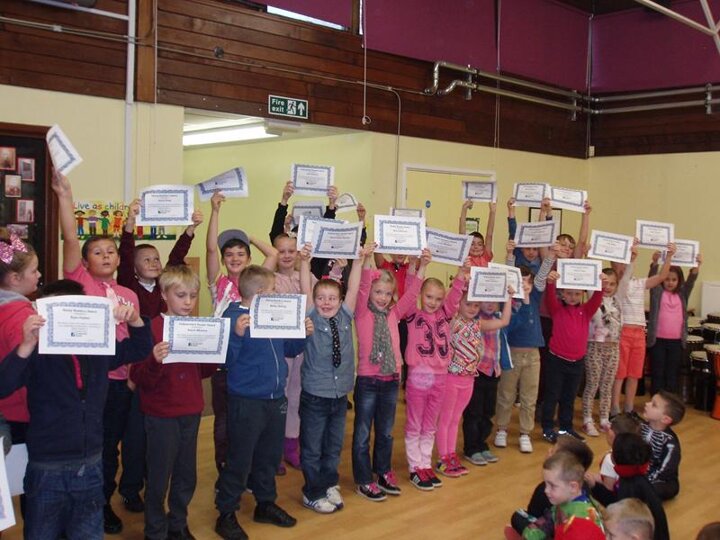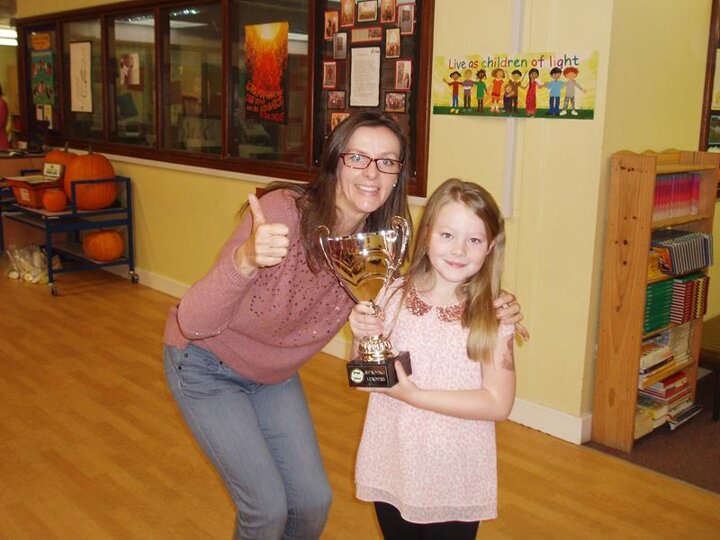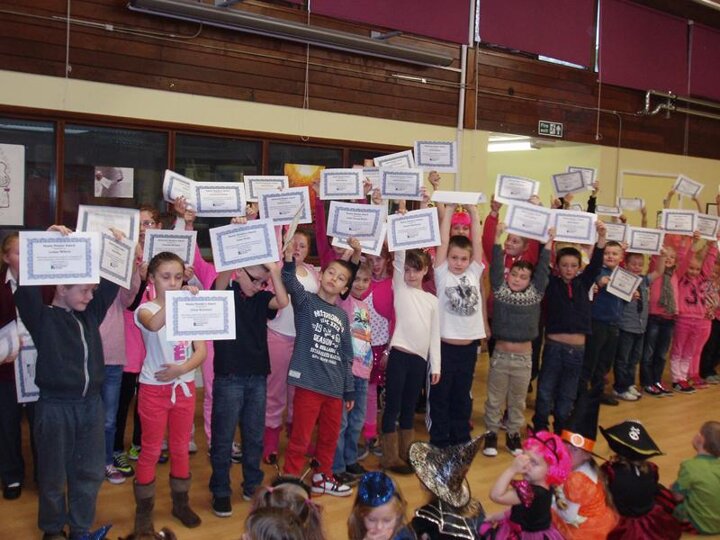Early Years
As soon as children join us in nursery at St. Wilfrid’s, they are engaged in carefully planned pre-literacy activities that help them to develop the skills needed to read and write. We use the Launchpad for Literacy approach to carefully assess each child’s readiness to begin learning phonics.
You can read about the Launchpad approach we use in our Early Years by clicking the link to their website: LAUNCHPAD FOR LITERACY
All children are taught to read at St. Wilfrid’s, using the synthetic phonics programme – Sounds Write. This structured scheme teaches children reading and spelling alongside one another, ensuring clear and strong links between the two skills are embedded.
The children are taught the initial code in early years, learning the sounds that are spelt with a single letter, and then are able to apply these to longer words, becoming ‘expert’ and fluent in these before moving to more complex sounds.
Find out more about Sounds Write here: SOUNDS WRITE PHONICS WEBSITE
Reading books are given to children as they learn new sounds and spellings. These are fully decodable, ensuring that the children have the opportunity to practise the phonics they are currently learning, revisit prior learning and enjoy success with reading from the start.
Alongside decodable books, children take home reading for pleasure books, that are not always decodable, but can be read with someone at home. These books are at an appropriate interest and experience level for the children and help them, with support from home, to learn more about stories, characters, how books work and of course, new vocabulary.
Key Stage 1
As children move into Key stage 1 (Year 1), they continue to learn to read and spell, using the Sounds Write programme.
The extended code is introduced to children in Year 1 – where two or more letters spell a single sound (ee, ou etc), and continue to develop their understanding and application of phonemes (sounds) and graphemes (letters) throughout Year 2. Children work daily, as a whole class, building, reading and spelling words containing the new phonic knowledge, and learning to apply these in their own writing. Throughout Year and most of Year 2, children continue to read decodable books until their phonic knowledge is secure and they are able to transition to our accelerated reader scheme.
Key Stage 2
In Key Stage 2, children continue to read, using the Accelerated Reader programme to encourage children to read independently, at a level that offers both success and challenge. This programme allows children to practise comprehension skills through online quizzes that teachers can use to monitor children’s progress. The Accelerated Reader library includes a wide range of children’s fiction and non-fiction books, which are levelled to ensure the children will be able to read and understand the books they choose. Children’s reading achievements are recognised in whole school assemblies every half term, when we celebrate and reward their successes together.
You can see information about your child’s progress by logging into Renaissance Home Connect with the user name and password they use at school. Click the links at the bottom of the page for more information.
In spelling and decoding activities across Key Stage 2, the Sounds Write approach is used to trigger prior knowledge, and apply this to tackling longer or tricky words and spellings.
Children who need further support with phonics benefit from carefully planned Sounds Write and Launchpad for Literacy based interventions, delivered one to one or within smaller groups, at their level, to help to narrow any gaps in their learning.
Across All Classes
At St. Wilfrid’s our aim is to provide a rich English curriculum across all classes, where children encounter a range of whole texts, reading or sharing these with confidence, engaging and responding to narrative and using their knowledge of these to influence and inform their skills as writers. Teachers carefully select fiction and non-fiction texts by award winning authors, that are engaging, stimulate book talk and of course widen valuable vocabulary, as well as being excellent models for pupils’ own writing.
Across all classes, children engage in daily reading activities. Pupils read both individually and within guided reading groups with the teacher or teaching assistant, embedding decoding skills, comprehension and book talk at all levels. These sessions focus carefully on individuals’ word reading and comprehension targets, and are used to track progress and inform planning. Teachers use the VIPERS acronym, and resource materials to support the understanding and teaching of key comprehension skills across school in all reading activities. Parents also have VIPERS prompts and ideas in reading records to support home reading.
As part of daily English lessons, pupils engage in shared reading sessions as a whole class. These are teacher led, and link to the current class text or lesson learning outcome. Children are encouraged to read as writers and write as readers, drawing from reading experiences to inform their comprehension skills, working walls, and their own writing.
At St. Wilfrid’s, reading across the curriculum is key. In all classes, reading corners are used to promote research and independent learning in current class topics. Durham Learning Resources are used to supplement school topic books, ensuring a wide diet of cross curricular reading is updated every half term to reflect current learning. Reading corners are timetabled for groups, ensuring all children are able to access these at least weekly.
Reading For Pleasure – Encouraging a Love of Reading
At St. Wilfrid’s our aim is to encourage a love of reading in all of our pupils, and to provide opportunities for children to read for both pleasure and purpose across all age ranges. We believe that books should be hands on and accessible to pupils at all times and in a range of contexts – during direct teaching time, snuggles in a reading corner, during a history lesson.
These include:
- Book Talk Guided reading sessions, led by teachers and teaching assistants within small groups of around six pupils
- Reading Journey Suitcases in each class. Each class has a suitcase, containing their core English books (selected by teachers) and books from Pie Corbett’s Reading Spine that complement core books, build reading stamina, develop language and of course engage the reader. These are read aloud by teachers, other adults in school and are available to pupils to become well acquainted with in class reading corners.
- Visits to the local library. We are lucky enough to be within walking distance of our local library. All classes will visit the library at least once in the academic year.
- Secondary texts. Class teachers select secondary and complimentary texts that support the current focus. For example – when studying The True Story of the Three Little Pigs, other traditional tales and alternative tales are provided in reading corners. In this way, children can explore and deepen their understanding of different text types independently.
- Cross curricular reading – reading for research. Each class utilises its reading corner to provide opportunities for cross curricular learning and research. These are updated at least half termly to reflect current topics and allow pupils to develop their use of non-fiction texts and widen curriculum knowledge. Texts are also used within cross curricular lessons as sources to inform teaching and learning.
- Home reading
- Regular author and story teller visits and workshops – we invite authors and storytellers to visit school regularly as part of a planned programme. Children have the opportunity to interact and learn from authors, read their work, hear them read aloud and take part in reading and writing workshops across school.
- Whole School Reading/Writing weeks – each term the whole school works together to enjoy a spectacular literacy week. The children thoroughly enjoy these weeks – particularly the sense of being part of a whole school literacy community and the immersive nature of the activities. Themes have been: Harry Potter, Pirates/Treasure Island, Winter/The Snow Queen, Jungle Book. Themes and outcomes relate to specific texts, often the classics or text types – instructional writing etc.
Reading at Home
Reading at home is key to a child’s success and we can not stress enough how important a parent’s role is in ensuring reading success.
We ask parents to read as often as possible at home, including decodable books, accelerated reader books. Alongside this, sharing a story, reading to a child, chatting about stories or looking at fact books is so important. In reading records, VIPERS posters give some ideas about what questions could help to improve comprehension skills.
PLEASE ASK IF YOU WOULD LIKE ANY HELP WITH READING WITH YOUR CHILD.
If you aren’t confident in reading to your child yourself, below are some links to story telling videos that you could share with your child.
Below are also some suggestions to help with home reading.
Useful Links and Downloads
Visit the AR Book Find site, to find books at your child’s level.
The Words for Life website has lots of information about activities and ideas to develop your child’s literacy skills, from birth to age 11.



